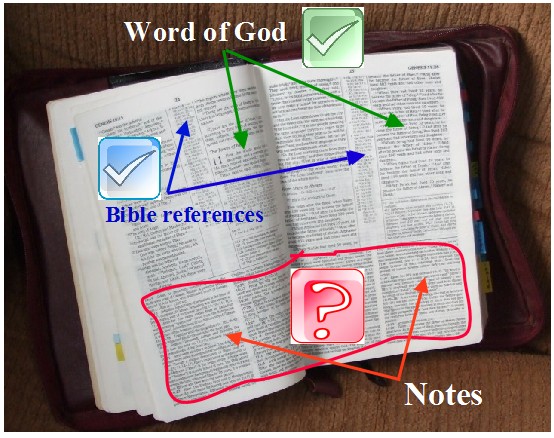Study Bibles: danger, handle with care!
We can be greatly helped but supplementary material when studying God's word. However there is an inevitable problem when using study Bibles which is not so prevalent when using other resources.
first publishe 29/12/2009
 THERE are a wide variety of books, publications and computer programmes which can assist the diligent believer to better understand the Word of God. However across the range of resources Study Bibles inevitably carry a hidden danger. THERE are a wide variety of books, publications and computer programmes which can assist the diligent believer to better understand the Word of God. However across the range of resources Study Bibles inevitably carry a hidden danger.
But why?
For most of us the human memory can play some strange tricks. We scour the house looking for something in the sure and certain knowledge that we know where we left it. However, it is only when the lost (mislaid) item appears somewhere else we discover that no matter how convinced we were, our memory has been proved to be faulty. We have forgotten; or – to put it another way – wrongly remembered.
In a similar fashion Dr. Paul Goebbels, Hitler’s Minister of Propaganda came up with the Big Lie theory: A lie, repeated often enough, will end up as truth. And we are told that, at an individual level, if a person tells a lie often enough then that person becomes convinced they are telling the truth.
The memory forgets things, but it can also generate false recollections.
So the memory cannot be trusted!
And it is here that we get to the problem with Study Bibles.
With the best intentions of assisting the reader, the publishers of study Bibles insert a great deal of material which brings added insights and background information to the scripture texts. However, and inevitably, this added content is influenced by the particular theological position of the human author. And we know how much difficulty that can cause!
Nevertheless, in the course of studying God’s word we will make natural recourse to the notes and, over a period of time forget – or fail to distinguish between – what we read in the Bible text and what we read in the notes. So our memories will just tell us: “I read it in the Bible.”
Without wishing to pinpoint any particular denomination or theological position, the issue is well illustrated in the Scofield Reference Bible. This publication has been used to support a theological position which is disputed by biblical scholars the world over. Yet it has been and continues to be highly influential in propagating a very particular view of Scripture interpretation and of end-time events.
In a similar fashion, other study Bibles will lead the reader to a different, but no less biassed, set of conclusions.
Hence the advice: be very careful when using study Bibles. And think carefully before you buy one. There are good alternatives.
So what are the alternatives?
Most Bibles use a referencing system which points the reader to supporting or related passages of Scripture and, generally speaking, the more expensive the Bible the more comprehensive will be the cross-referencing. Additionally there are ‘Chain Reference’ Bibles which expand on the referencing principle by making it easier, in systematic fashion, to ‘follow a thread’ of thought, doctrine or topic through the Word of God.
Regarding Bible commentaries, it is better to have access to more than one. But even if we only have one, at least a commentary is a separate book which will not carry the same danger of being perceived as 'the Bible'.
Additionally, in the internet age, there is quick, easy and free access to a multitude of commentaries giving the average person the type of facilities which would otherwise only be found in the libraries of Bible colleges. (There is a word of warning here. Treat information on the internet with great caution. There is a lot of good material ‘out there’, but there is also a sea of rubbish and harmful content.)
So what do I do with my Study Bible?
By all means make use of it. Most study Bibles very helpfully contain maps, charts, historical and archeological notes, etc. – all of which are very helpful supplements. Additionally (if the study Bible has any integrity) the notes will set out the different views if and where these exist. However the problem here is that we tend to be predisposed to believe what we want to believe. So, and in conclusion, be very careful when reading notes in a study Bible.
Your memory might (with justification) convince you:
‘I read it in the Bible’.
"Now these were more noble-minded than those in Thessalonica, for they received the word with great eagerness, examining the Scriptures daily, to see whether these things were so. " (Acts 17:11)

Some links to Bible web sites and programmes:
Bible Gateway Bible Study Tools Blue Letter Bible E-Sword
Footnotes:
1. It is not only study Bibles that present us with this problem. Venerated doctrinal statements and confessions of faith – historical or otherwise – can lead us into this trap.
2. The reference to Goebbel's is there merely to illustrate the potency of repetitive messages in that they can become 'embedded', whether or not they are true. There is no suggestion that Bible notes (Scofield's et al) share Goebell's philosophies or intentions to delibeately deceive.
|